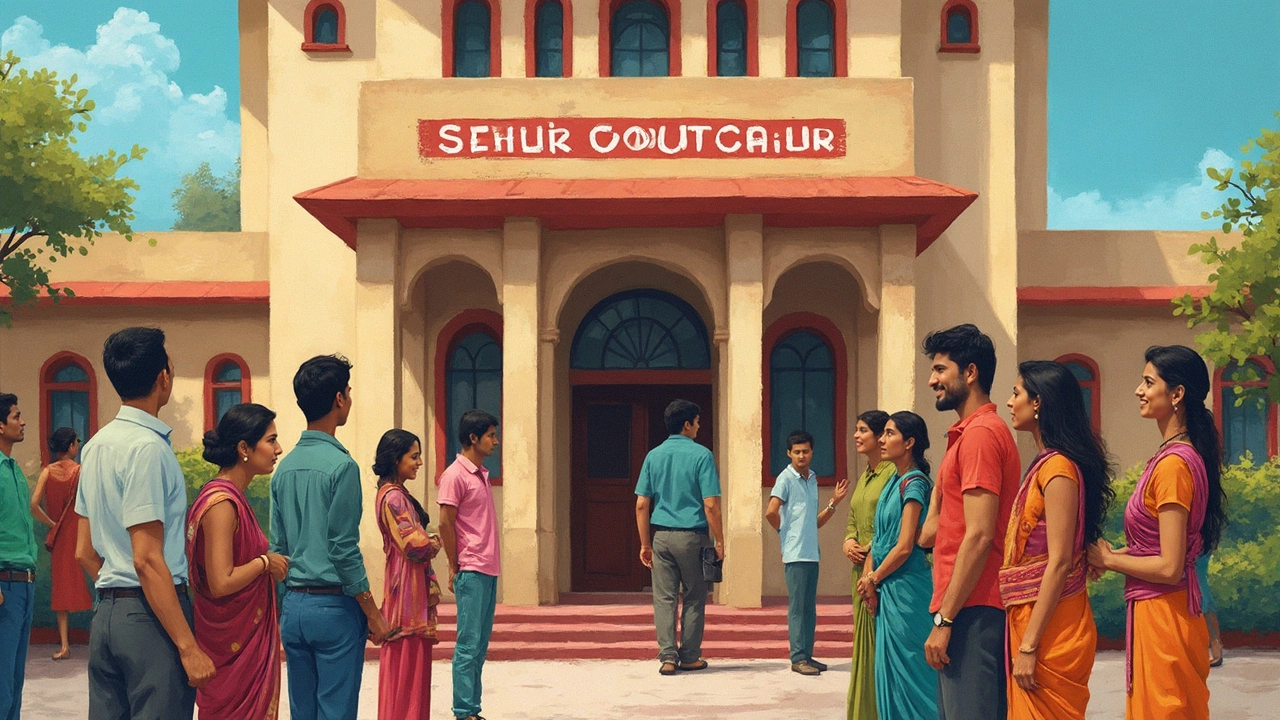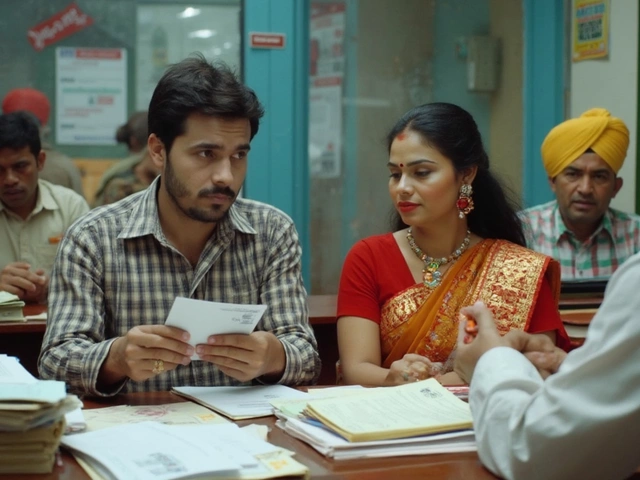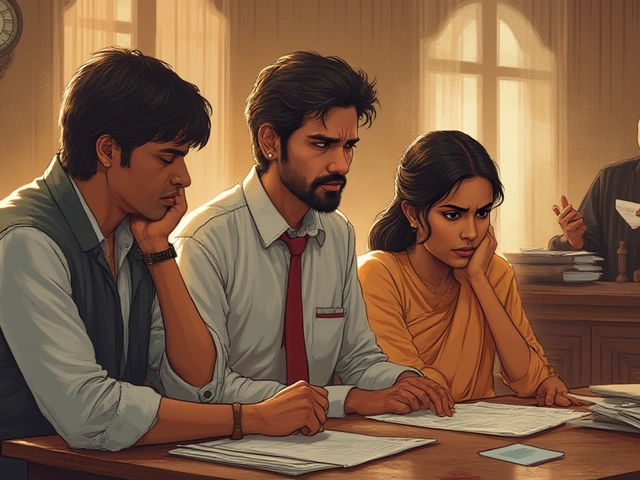If you think every civil case ends in a dramatic courtroom showdown, that's just TV talking. The reality is way less glamorous—roughly 95% of civil cases never reach trial. Instead, they settle, get dismissed, or just fizzle out before anyone sets foot in a courtroom.
This makes sense when you realize how draining court battles can be. Legal fees add up fast, court schedules drag on forever, and the outcome is never a sure thing. So, people settle. That means both sides agree on a solution, often with money changing hands and the problem going away for good.
Sometimes, cases get thrown out by a judge or one side just gives up. And sure, a tiny fraction go to trial, but that's rare. If you're involved in a civil dispute, don't expect a scene out of "Suits." Instead, get ready for lots of paperwork, negotiation, and maybe a settlement offer popping up when you least expect it.
- Civil Case Basics: What Really Happens
- Why Most Cases Settle Before Trial
- Settlement or Dismissal: Common Endings
- What Happens When a Case Goes to Trial?
- Is It Worth Going to Court? Practical Tips
- Final Thoughts: How to Handle a Civil Case
Civil Case Basics: What Really Happens
When people hear "civil court," they might picture two folks shouting at each other in front of a judge. Real life is far less dramatic. So, how do civil cases really work from start to finish?
It all kicks off when one person or business files a complaint—usually to get money or make someone stop doing something. This person is the plaintiff. The person getting sued is the defendant. Once that paperwork is filed, the defendant has to respond within a set number of days, often around 30.
After that, both sides start what lawyers call "discovery." This is when they swap documents, take depositions (which are like interviews under oath), and gather evidence. The main goal? Everyone wants to avoid surprises if the case does go in front of a judge.
The whole thing can drag on for months—or even years. But here's a quick breakdown of the usual stages:
- Complaint filed: Plaintiff starts the lawsuit.
- Answer filed: Defendant responds to the complaint.
- Discovery phase: Both sides collect and exchange evidence.
- Pre-trial motions: Each side may ask the judge to close the case or limit what evidence comes in.
- Settlement talks: Negotiations ramp up after discovery. Most cases settle here.
- Trial: If no settlement, the case finally goes to court. But this hardly ever happens.
Want numbers? Check out this table showing what happens to most civil court cases in the U.S.:
| Case Outcome | Percentage |
|---|---|
| Settled Before Trial | ~65% |
| Dismissed/Withdrawn | ~30% |
| Goes to Trial | ~5% |
Most people imagine courtrooms packed with drama. In reality, it's negotiation over paperwork, scheduling headaches, and doing a lot of waiting. If you're dealing with a civil lawsuit, don't expect a quick fix or a made-for-TV moment. Instead, get prepped for a long process with lots of steps and chances to try and settle before things ever get to a judge.
Why Most Cases Settle Before Trial
Most folks are surprised to hear just how few civil cases actually reach a courtroom trial. Honestly, dragging a case all the way through can eat up months or even years, not to mention a stack of cash. Because of all this, settling almost always makes more sense—for both sides.
Here's what goes on behind the scenes: courts are slammed, legal fees add up, and almost nobody wants their personal drama to become public record. So, people cut deals to save time, money, and stress. In fact, recent court statistics in the U.S. show that about 95% of civil lawsuits settle or get dismissed long before a judge ever bangs a gavel.
Check out these numbers from 2024 to get the picture:
| Case Outcome | Percentage |
|---|---|
| Settled | 72% |
| Dismissed | 23% |
| Trial | 5% |
There are a few big reasons behind all these settlements:
- Cost: Trials are expensive. Even a simple lawsuit can mean thousands in attorney fees. Most people don't want to risk losing and paying even more.
- Time: You could be stuck waiting for a year (or longer) for a trial date. Settling usually takes way less time.
- Uncertainty: Courts are unpredictable. Settling means you control the outcome instead of leaving it up to a judge or jury.
- Privacy: Settlements often stay confidential, unlike trials where everything goes public.
- Stress: No one likes the back-and-forth of depositions and court appearances. Settling means less hassle and emotional strain.
If you’re ever in a civil dispute, remember why most cases settle: it’s almost always the less risky, quicker, and cheaper option. That’s why this is the road most people take before they ever see the inside of a courtroom.
Settlement or Dismissal: Common Endings
Honestly, most civil cases don’t end with a judge banging a gavel. They wrap up with a quiet agreement or get dropped altogether. If you look at numbers from the US federal courts in recent years, around 70% of civil lawsuits ended with a settlement, while about 20% got dismissed by the court or withdrawn by one of the sides. Only about 10% made it further, and barely 3% saw a full-blown trial.
| Case Outcome | Estimated Percentage |
|---|---|
| Settlement | ~70% |
| Dismissal/Withdrawal | ~20% |
| Trial | ~3% |
| Other | ~7% |
So, what actually happens in these common endings?
- Settlement: Both sides cut a deal before things get heated in court. Maybe someone agrees to pay a little, apologize, or fix a problem. These deals can happen any time, even right before a trial or after it’s already started. Once the papers are signed, the case is over and neither side can argue the same complaint again.
- Dismissal: Cases get dismissed for a bunch of reasons. Maybe the plaintiff didn’t have enough evidence, missed deadlines, or just lost interest. Judges can also dismiss if the lawsuit itself doesn’t make legal sense, like when there’s no real claim on the table. Sometimes, both sides just agree to walk away and the court closes the file.
A professor from Stanford Law School put it simply:
"Most civil disputes end not because of who’s right, but because both sides would rather move on than gamble months in court."Nobody wants to spend years on paperwork, ugly emails, and court appearances unless there’s no other way.
Here’s a tip: settling isn’t just about splitting the difference—there’s strategy involved. Lawyers literally practice negotiating better deals, and you’d be surprised how much wiggle room there is if you’re honest about your goals (and your limits).
Sometimes, people get anxious that accepting a settlement means admitting they did something wrong, but it doesn’t usually work that way. Most settlement agreements specifically say there’s no admission of guilt—just an agreement to end the fight.

What Happens When a Case Goes to Trial?
When a civil case actually goes to trial, it's a whole different ballgame. Unlike TV dramas, real trials are mostly about procedure, paperwork, and back-and-forth between attorneys. Both sides have usually failed to come to any agreement, so now a judge—or sometimes a jury—will decide what happens.
The trial kicks off with what's called voir dire if there's a jury. That's just a fancy term for picking the people who'll decide the case. If it's a bench trial, only the judge listens in. The main steps look like this:
- Opening statements: Both lawyers start by explaining their side of the story and what they hope to prove.
- Presentation of evidence: This is when witnesses are called, documents are shown, and sometimes experts give opinions. Each side gets a turn.
- Cross-examination: Lawyers try to poke holes in the other side's story by questioning witnesses.
- Closing arguments: Time for each lawyer’s last word, making their best pitch to the judge or jury.
- Deliberation and verdict: If there’s a jury, they go to a private room and talk it out. If it’s a judge, the decision might come right away or after a bit of time.
Courtroom rules are strict—no surprises or last-minute drama like in the movies. Attorneys have already shared most evidence before trial (it's called discovery), so the trial is about arguing over what that evidence means.
Here's something that might surprise you: even after a trial has started, most civil cases can still settle right after the evidence is heard or even while the jury is out deliberating.
Curious about how long this all takes? Trials can run from a single afternoon to several weeks. Those epic court cases you hear about—those are the rare exceptions. Here's a quick look at some numbers:
| Stage | Average Duration |
|---|---|
| Trial Preparation | 6-18 months |
| Actual Trial | 1 day to 3 weeks |
| Jury Deliberation | 2 hours to 3 days |
Once the verdict is in, the losing side can still appeal if they think the law was applied wrong. But appeals mean even more time and money. Most people are ready to move on by this point, especially after seeing how much effort goes into a full-blown court case.
Is It Worth Going to Court? Practical Tips
Thinking about dragging your civil dispute all the way to court? Pause for a second. Most folks discover that settling outside the courtroom saves time, energy, and money. Court battles often last over a year, and legal costs can get out of hand fast. According to the American Bar Association, the average cost of going to trial in a federal civil case is around $50,000 per side—sometimes way more.
Here’s a simple breakdown so you can compare how civil cases usually end and what you might expect:
| End Result | Time to Resolve | Estimated Cost (USD) | Chance of Happening |
|---|---|---|---|
| Settlement | 2-9 months | $10,000 - $25,000 | ~65% |
| Dismissal/Drop | 1 week - 6 months | $3,000 - $10,000 | ~30% |
| Trial/Verdict | 12-36 months | $40,000 - $200,000 | ~5% |
If you’re still not sure whether to take your case to court, run through these checkpoints first:
- Do you have solid evidence? If things are shaky, a trial might not end well.
- Can you handle the costs? Even if you win, court costs can gobble up a big chunk of your payout.
- Are you okay with waiting? Civil trials rarely move fast. Some drag on for years, especially if there are appeals.
- Would a settlement give you what you need? Sometimes, a bird in the hand is really worth two in the bush. Getting paid sooner and skipping the stress is a big plus.
- Have you explored mediation? That’s when a neutral person helps both sides reach an agreement, and it works for lots of cases.
Bottom line: Only a tiny sliver of civil lawsuits actually make it to trial. People usually settle because it makes financial sense and keeps the drama to a minimum. Before heading to court, weigh the real costs, think about your goals, and consider talking to a lawyer who can size up your unique situation without sugarcoating things.
Final Thoughts: How to Handle a Civil Case
Dealing with a civil case isn’t just about showing up in court with a good story. Most of the action happens before anyone sees a judge. Here’s the truth—having the right approach from the start saves you money, stress, and often gets you a better outcome.
One thing that really makes a difference is tackling paperwork right away. Missing a deadline could mean your case is kicked out before it even starts. Also, hang on to all your emails, texts, and anything else connected to the dispute. Even one missing piece can mess things up, especially if you end up negotiating a settlement.
If this is all new to you, think about getting legal advice before things spiral. A chat with a lawyer doesn’t have to cost a fortune—lots offer a free consultation for first-timers. As Judge Marilyn Milian from "The People’s Court" puts it:
“Listen, court is not a place for surprises. Preparation beats passion every time.”
It’s not just what you say, but having your ducks in a row before you speak. If someone offers a settlement early, don’t feel pressured to grab it right away. Take a beat, think about what you’d actually walk away happy with, and maybe even talk to someone who knows the ropes.
- Stay organized—keep all your papers, dates, and notes in one spot.
- Don’t ignore letters from the court or from the other side. Respond on time, every time.
- Be realistic about how long things might take—some civil lawsuits drag on for months, even years.
The bottom line is, most civil cases settle because that’s usually the smartest move. Staying cool, getting advice, and knowing what you want before you start is how you avoid headaches down the road.


